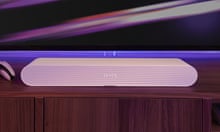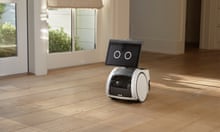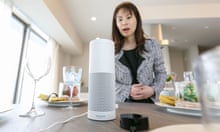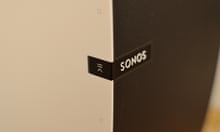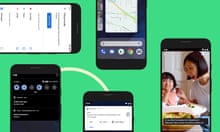The popularity of Amazon’s Echo smart speakers has helped push the audience for digital radio past that of FM and AM in the UK for the first time. The milestone, which was reached in the first quarter of this year, could prompt the government to launch a review to evaluate whether it should switch off the FM signal.
Digital, which covers listening via digital audio broadcasting (DAB) sets in homes and cars, televisions and through services such as Echo, hit a record share of 50.9% of all radio listening in the three months to March.
Amazon’s smart speakers, powered by the virtual assistant Alexa, have helped reinvent the medium for a new, tech-savvy generation, many of whom have failed to embrace traditional radio listening.
Listening online and via apps proved to be by far the fastest-growing segment of digital consumption, with hours of listening in the first quarter surging by 14m (17%) year on year to 95m hours. This now makes up almost a fifth of all digital listening, and almost 10% of all radio listening including on traditional FM and AM radios.
The greatest amount of digital listening takes place on DAB radios – two-thirds of UK adults have access to one at home, and they are in 11m cars – which now accounts for 36.8% of all listening and 72% of digital listening. The number of hours of DAB radio listening grew by 31m hours (8.9%) year on year in the first quarter, to 376m hours.
Radio listening via a TV set accounts for 4.8% of total radio listening and 9.4% of digital listening. Listening in this sector fell slightly, by 7m hours, to 49m hours in the first quarter.
“This is a landmark moment for for the radio industry and for listeners alike,” said Ford Ennals, the chief executive of Digital Radio UK. “The digital transition is good news for radio and is helping our industry compete more effectively in the digital age.”
The radio industry has reacted to the shift in listening habits with digital-only stations such as BBC 6 Music, Kisstory and Heart 80s, as well as regional FM stations such as LBC, Radio X and Magic, and has now truly taken the step to national coverage via its expansion on the DAB platform. There remains, however, a reluctance to set a switch-off date for FM.
James Purnell, the BBC’s director of radio and education and a former Labour culture secretary, said: “We’re fully committed to digital and growing its audiences, but, along with other broadcasters, we’ve already said that it would be premature to switch off FM.”
Nick Grimshaw, who is being may be being moved towards the exit from the BBC Radio 1 breakfast show, lost 626,000 listeners in the first three months of the year compared with the same period last year, falling to a total audience of 5.09m.


